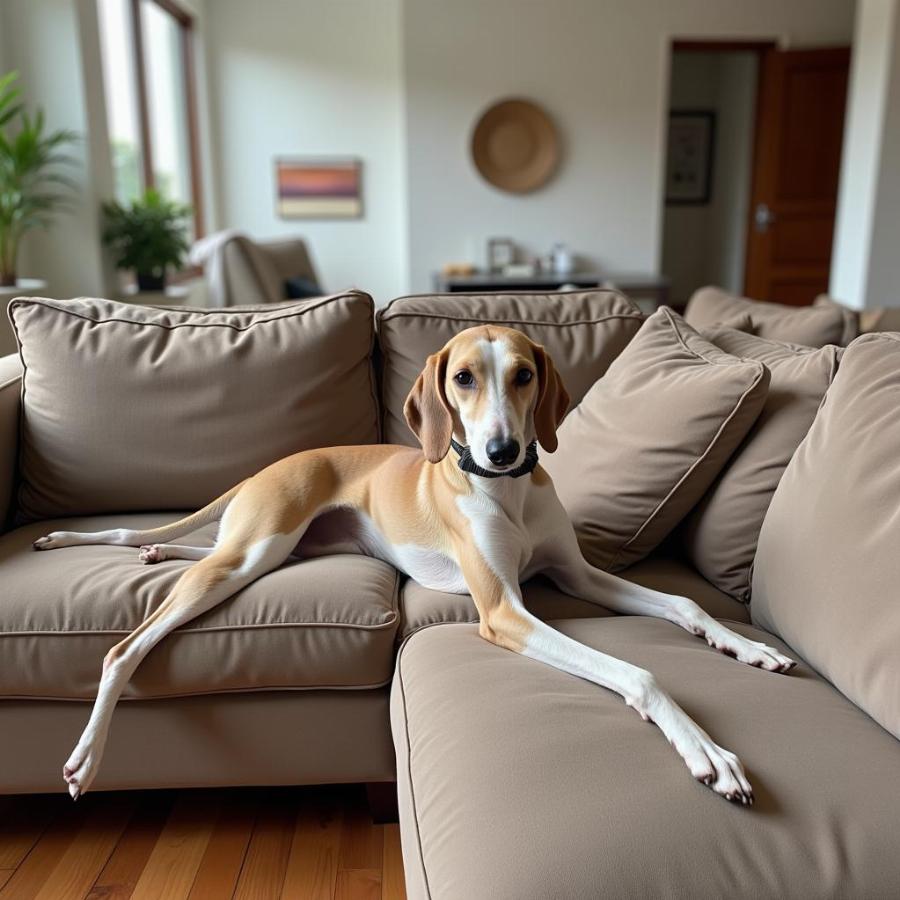The “thin man’s dog” – a phrase often uttered with a knowing smile among dog enthusiasts – instantly conjures up the image of the Greyhound. This breed, known for its incredible speed and sleek physique, is often associated with racing. However, there’s much more to Greyhounds than meets the eye. These gentle souls, with their quiet demeanor and surprisingly lazy nature, make wonderful companions for a variety of households. Let’s delve deeper into the world of the Greyhound and discover what makes this breed so unique.
Unveiling the Greyhound: Beyond the Racetrack
While their history is deeply rooted in racing, Greyhounds are increasingly finding their place as beloved family pets. Their calm and affectionate personalities often surprise those unfamiliar with the breed. Don’t let their athletic build fool you – Greyhounds are known to be couch potatoes at heart, perfectly content lounging around the house with their loved ones.
 Greyhound Relaxing on Couch
Greyhound Relaxing on Couch
Debunking Myths: Greyhound Temperament and Energy Levels
One of the biggest misconceptions about Greyhounds is their perceived need for constant exercise. While they enjoy a good run, Greyhounds are actually quite low-energy dogs indoors. They are sprinters by nature, not marathon runners. A daily walk or a short burst of play in a fenced-in area is often sufficient to meet their exercise needs.
Greyhounds are incredibly gentle and affectionate with their families. They are known for their loving and even somewhat goofy personalities. Their quiet nature also makes them suitable for apartment living, as they are not prone to excessive barking.
Caring for Your Greyhound: Health, Grooming, and Training
Greyhounds are generally healthy dogs, but like all breeds, they are prone to certain health concerns. It’s important to be aware of these potential issues and work with your veterinarian to ensure your Greyhound receives proper care throughout their life.
-
Bloat: This is a serious condition that can affect deep-chested breeds like Greyhounds. It’s important to feed your Greyhound multiple small meals throughout the day and avoid strenuous exercise immediately after eating.
-
Anesthesia Sensitivity: Greyhounds can be more sensitive to anesthesia than other breeds. It’s crucial to inform your veterinarian about your dog’s breed before any procedures requiring anesthesia.
-
Osteosarcoma: This type of bone cancer is more common in larger breeds like Greyhounds. Regular veterinary checkups and early detection are essential.
Grooming a Greyhound is relatively easy. Their short, smooth coats require minimal brushing. However, they are prone to dental issues, so regular teeth brushing is a must.
Training a Greyhound can be a rewarding experience. They are intelligent dogs that are eager to please. Positive reinforcement methods, such as treats and praise, work best.
“Greyhounds are incredibly intelligent and responsive to positive reinforcement. Patience and consistency are key to successful training.” – Dr. Emily Carter, Veterinarian and Greyhound Advocate
Is a Greyhound Right for You?
A Greyhound can be a wonderful addition to a variety of homes. They thrive in loving environments where they receive plenty of affection and companionship. If you’re looking for a low-maintenance, affectionate, and surprisingly lazy companion, the Greyhound might just be the perfect fit for you.
Frequently Asked Questions about Greyhounds
Q: Are Greyhounds good with children?
A: Yes, Greyhounds are generally good with children, especially when raised together. However, as with any breed, supervision is always recommended.
Q: Do Greyhounds have a high prey drive?
A: Greyhounds do have a natural prey drive due to their racing history. It’s essential to keep them leashed in off-leash areas and supervise them around smaller pets.
Q: What is the lifespan of a Greyhound?
A: The average lifespan of a Greyhound is 10-13 years.
Q: Are Greyhounds hypoallergenic?
A: No, Greyhounds are not hypoallergenic. They do shed, but their short coats make shedding relatively manageable.
Q: Where can I adopt a Greyhound?
A: There are many Greyhound adoption organizations across the country. You can also check with your local animal shelter.
Looking for More Information on Dog Breeds and Care?
For a wealth of knowledge on various dog breeds, including their unique traits and care requirements, be sure to explore our other insightful articles on plaque off powder dogs, dogs before and after being called a good boy, and designer dog toys. We’re dedicated to providing you with the information you need to be the best pet parent you can be!
About Beaut Dogs
Beaut Dogs is your trusted source for all things dog-related. We’re passionate about providing dog lovers with reliable and insightful information to help them provide the best possible care for their furry companions. If you have any questions or need further assistance, don’t hesitate to reach out to us at [email protected]. We’re always here to help!